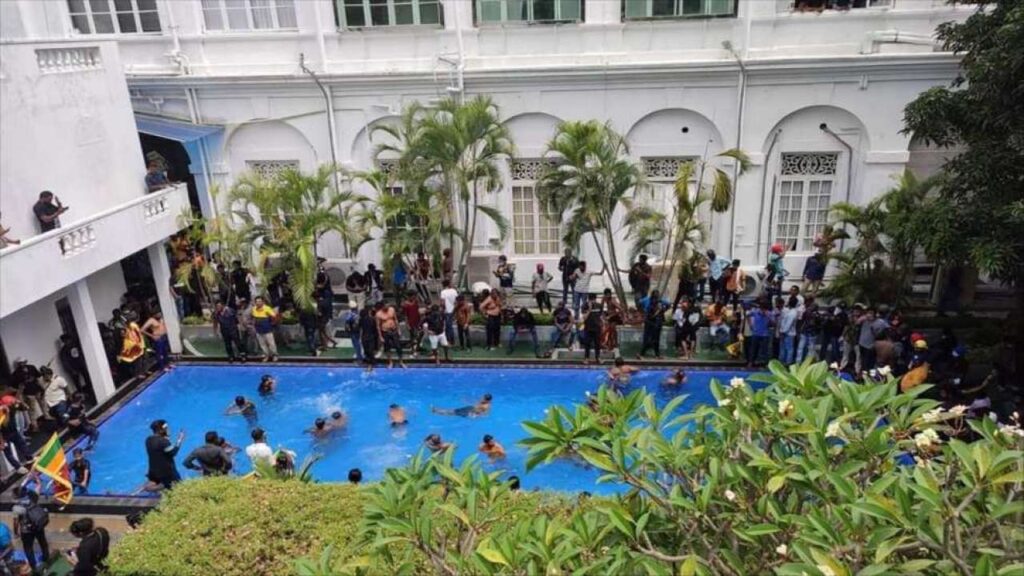Fording The Troubled Waters Of Unrest
Jul 15, 2022 | Shalini Rai
Sri Lankan protesters try out the swimming pool inside the President's residence after Gotabaya Rajapaksa fled (IANS)
The last few days, some unexpected images have dominated the world news scene. Visuals of people swimming in clear blue pools, lounging around under the shade of trees and walking through luxurious verandahs in Sri Lanka’s Presidential Palace have been broadcast into our homes and printed onto the front pages of daily newspapers. Sri Lankans, fed up of living frugally and sometimes in downright destitute conditions, organised, stormed into and occupied the Palace, with the whereabouts of its once heavily-guarded occupants enjoying unseemly luxury and immunity from pauperism, even as the common people struggled to stay afloat, unknown. There is a delight visible in these photographs, a sense of implied freedom and concomitant rebelliousness.
While this may seem surprising, it is not really so.
Just last year, on January 06, a mob of Trump supporters, after attending a rally, at his behest, stormed the U.S. Capitol, entered the hallowed halls of the building, posed for photographs, clashed with Capitol Police, tried to break into the chambers of the Senate and called for Vice-President Mike Pence to be ‘hanged’. At one point, the Trump supporters/rioters were reportedly “within 100ft” of Pence and a foot away from one of the doors to the chamber, with many Senators still inside. Later, House of Representatives Speaker Nancy Pelosi and Mike Pence are safely evacuated from the building. Since its object was to prevent a legitimate president-elect from assuming office, the attack was widely regarded as an insurrection or attempted coup d’état.
Yesterday was July 14, the day of the storming of the Bastille in 1789. At the time of the French Revolution, the Bastille represented royal authority and symbolised the oppressiveness of France’s aristocracy. A fortress and political prison, it was attacked by a crowd mainly consisting of sans-culottes, or lower classes. The anniversary of the attack is still celebrated in France as the country’s national holiday. The storming of the Bastille saw the first large-scale response by the sans-coulettes in the French Revolution; it was also the first time that bloodshed and mob rule became part of what until then had been a relatively peaceful and orderly affair. It later became a major turning point in which the omnipotence of the king diminished and the process of the collapse of the monarchy began.
Nearly 233 years later, the similarities between the storming of the Bastille and the mob action in Sri Lanka and the U.S. Capitol riots are too many to be ignored. The mob action in all three cases took place because the people who were part of it were completely frustrated and felt they had run out of options to express their woes, communicate with the authorities and remedy their increasingly desperate situation.
While the Bastille action proved decisive in the fall of the French monarchy, depositions and hearing into the U.S. Capitol riots are still underway, with several allegations against Donald Trump re-surfacing and impacting his political career in ways no one can yet foresee.
What can be predicted with reasonable certainty is that the scenes from Sri Lanka’s Presidential Palace and other residences of leading public figures are not going away any time soon. Given the gaping void between the rich and the poor, the advantaged and the disadvantaged, the empowered and the powerless, it is only prudent to expect such scenarios to be played out time and again.
Unless the basic issues surrounding people’s daily lives are addressed with sincerity and empathy, it is necessary to be prepared for a repeat of similar incidents. When the general cost of living becomes increasingly unaffordable, when the price of diesel, petrol, gas cylinders, electricity, other daily necessities skyrockets and when the disadvantaged many see the fortunate few leading discordantly luxurious lives, it is fitting to be prepared for a large-scale backlash.
The sheer size of the ‘mob’ in Sri Lanka and the U.S. made redundant any law enforcement efforts and pleas for back-up. The general public knows that the ‘rulers’ are too few and that the ‘ruled’ outnumber them several times over. It is only a matter of time till the public stops being entangled with the business of getting through life on a day-to-day basis on measly income and increasingly hopeless future prospects and realises its potential to affect political change.
Then, when it comes, like it did in France, in America and in Sri Lanka, at different times in history, the deluge of dissent will decisively and inexorably inundate authority figures, challenge establishment entities and render ineffective governmental checks and balances. If this has not yet happened, it can only be rationalised as a delayed response. That it will happen is a given and the sooner the powers-that-be realise it, the better-equipped they will be to respond to such a denouement.
